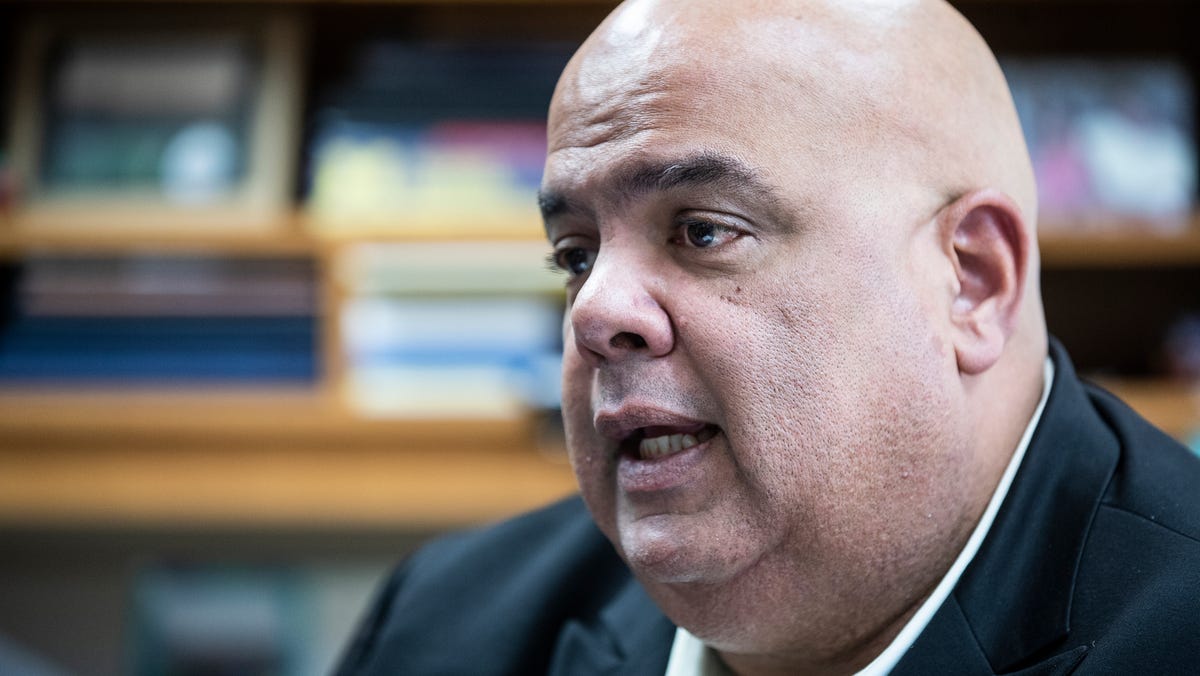Politics
Israel hits Iran with 'limited' strikes despite White House opposition
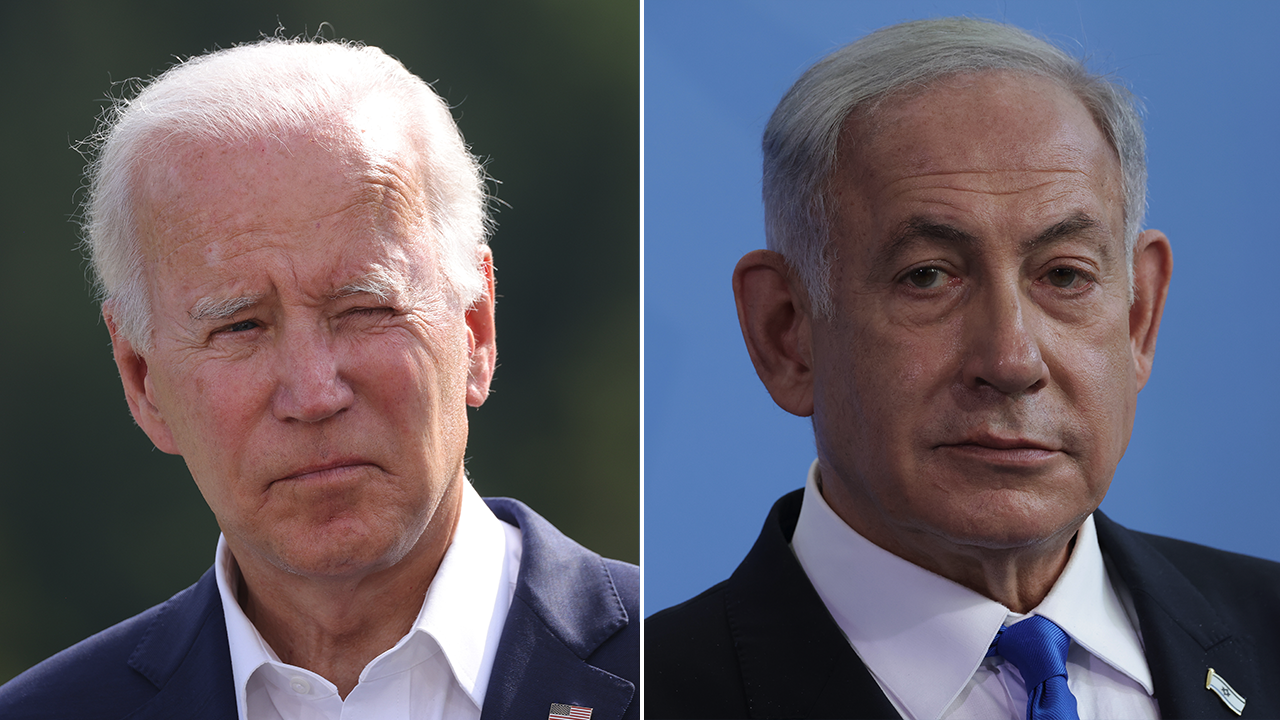
Despite the White House voicing its opposition against Israel striking back at Iran, the Jewish state issued “limited” strikes early Friday.
Fox News Digital has confirmed there have been explosions in Isfahan province where Natanz is located, though it is not clear whether it has been hit.
A well-placed military source has told Fox that the strike was “limited.”
The news came after President Joe Biden warned Prime Minister Benjamin Netanyahu that the U.S. would not take part in a counter-offensive against Iran.
ISRAEL STRIKES SITE IN IRAN IN RETALIATION FOR WEEKEND ASSAULT: SOURCE
Democrats have expressed concern that President Biden has ruined his standing among progressives with his support for Israel. The president criticized Israeli Prime Minister Benjamin Netanyahu over Israel’s conduct during its war with Hamas. (Getty Images)
John Kirby, the White House’s top national security spokesperson, told ABC’s “This Week” program on Sunday, April 14 that the United States will continue to help Israel defend itself, but does not want war with Iran.
Kirby said “our commitment is ironclad” to defending Israel and to “helping Israel defend itself,” after being asked if the U.S. would support retaliation.
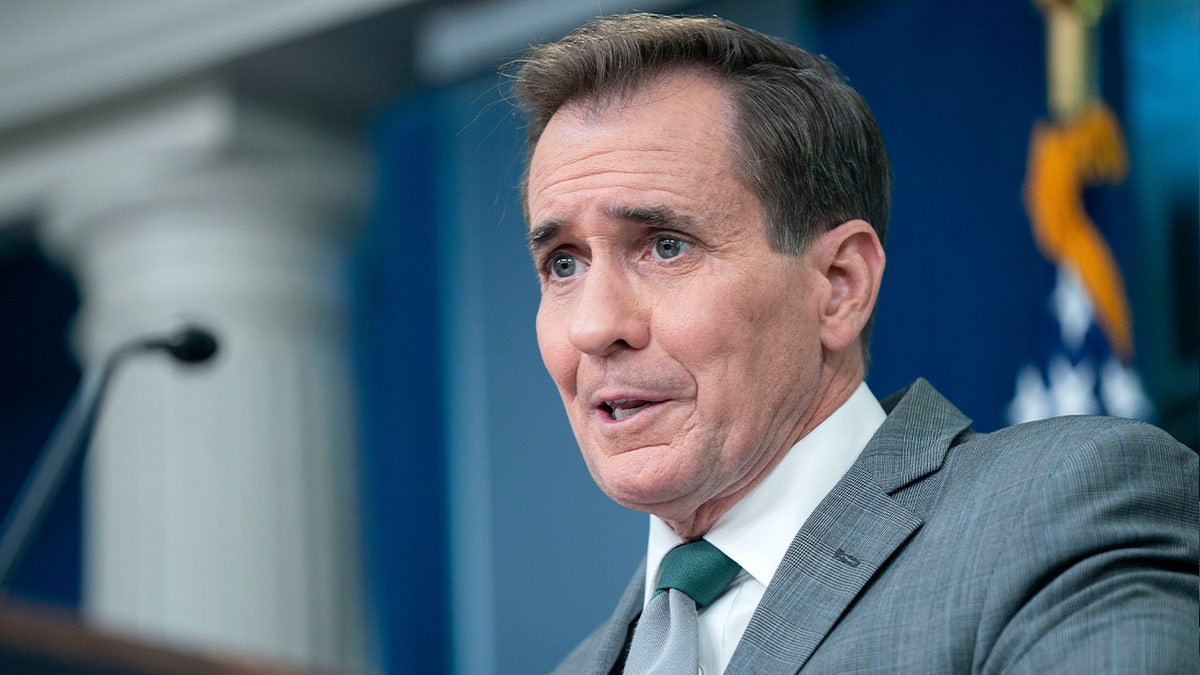
John Kirby, White House national security communications advisor, during a news conference in the James S. Brady Press Briefing Room at the White House in Washington, DC, US, on Monday, April 15, 2024. (Bonnie Cash/UPI/Bloomberg via Getty Images)
Kirby doubled-down on the fact that Biden does not “seek” war with Iran.
“And as the president has said many times, we don’t seek a wider war in the region. We don’t seek a war with Iran. And I think I will leave it at that,” Kirby added.
ISRAEL’S ADVANCED MILITARY TECHNOLOGY ON FULL DISPLAY DURING IRAN’S ATTACK
“We don’t seek escalated tensions in the region. We don’t seek a wider conflict,” Kirby said.
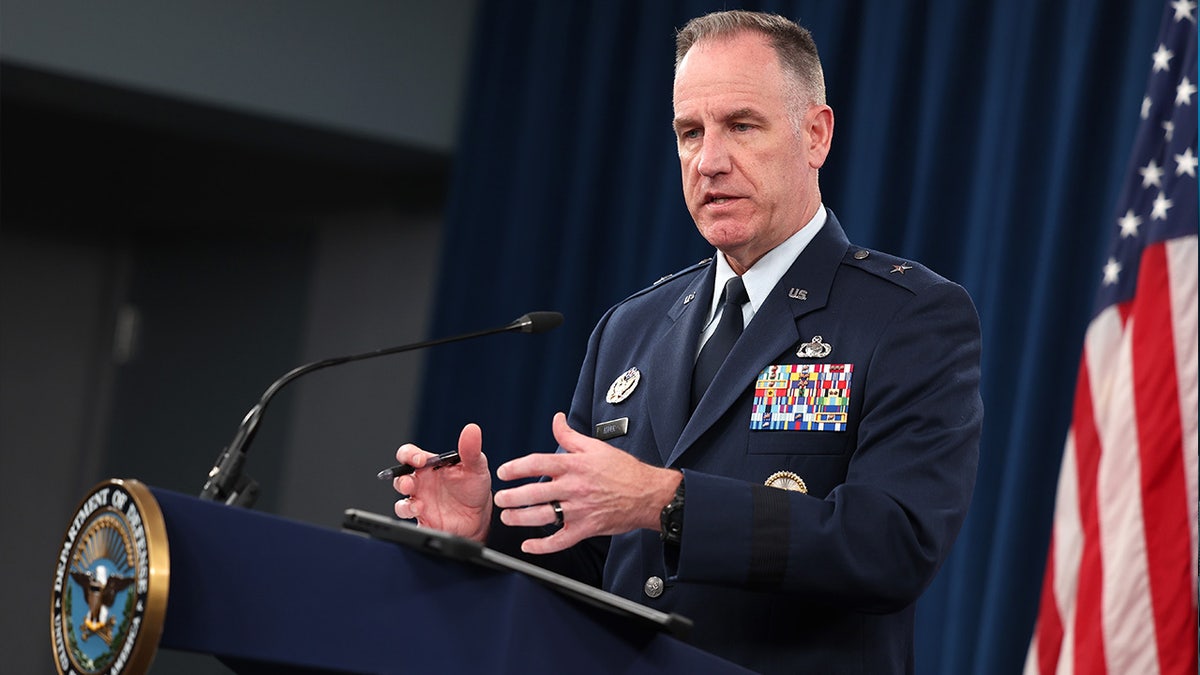
Pentagon Press Secretary Air Force Brig. Gen. Pat Ryder holds a press conference at the Pentagon on October 19, 2023 in Arlington, Virginia. (Kevin Dietsch/Getty Images)
Pentagon Press Secretary Major General Pat Ryder echoed Kirby’s sentiments, sharing in a press briefing that the U.S. does “not want to see a wider regional war.”
“As I’ve highlighted, we do not seek escalation in the region, but we will not hesitate to defend Israel and protect our personnel,” he said during the question and answer segment of the briefing.
“Again, we do not want to see a wider regional war,” he added. “We don’t seek conflict with Iran, but we won’t hesitate to take [the] necessary actions to protect our forces.”
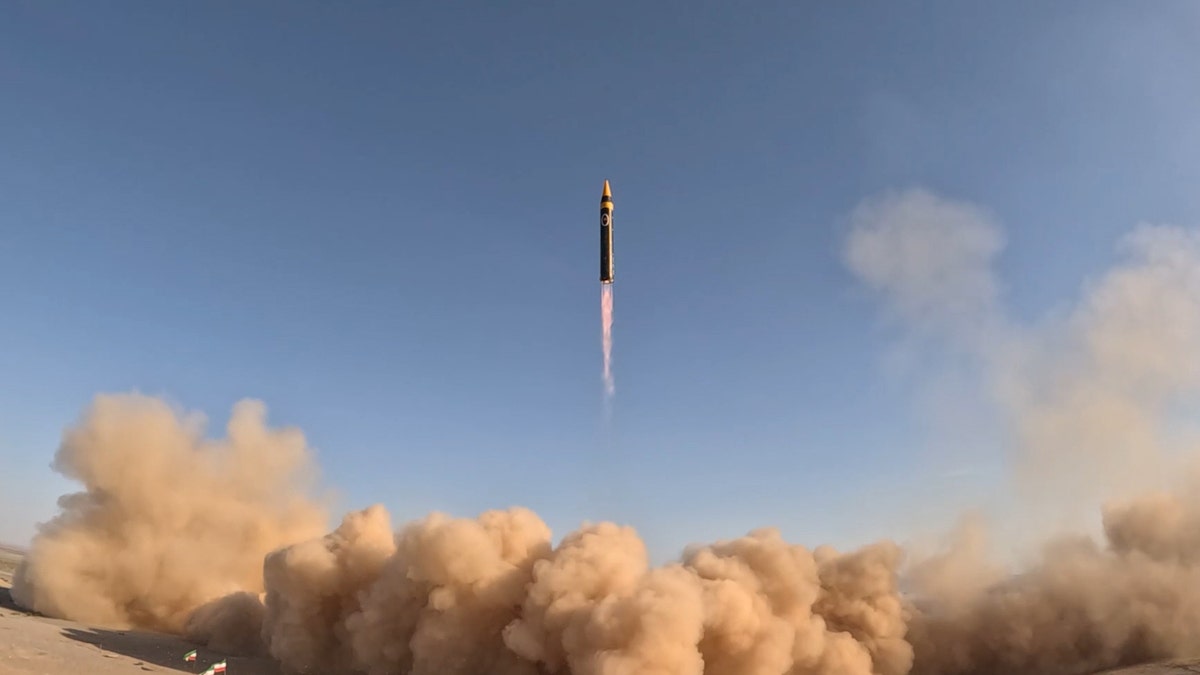
Iran’s medium-range ballistic missile called Hayber (Hurremshahr-4) is seen after the launch during the promotional program organized with the participation of high-ranking military officials in Tehran, Iran on May 07, 2023. (Iranian Defense Ministry/Hanodut/Anadolu Agency via Getty Images)
Reports of Israel’s “limited strike” against Iran came following a retaliatory strike over the weekend.
Iran attacked Israel over the weekend in retaliation for Israel’s deadly strike on Iran’s consulate in Syria earlier this month that killed a dozen people, including a top general.
The weekend attack by Iran marked a major escalation of violence. Despite decades of hostilities between the two nations, Iran has never directly attacked Israel, instead relying on proxy forces in Iraq, Lebanon and elsewhere.
Fox News’ Bradford Betz and Jennifer Griffin contributed to this report.

Politics
The White House has a new curator. Donna Hayashi Smith is the first Asian American to hold the post

The White House has a new curator and Donna Hayashi Smith is the first Asian American to hold the post.
The White House announced her appointment Wednesday, the start of Asian American, Native Hawaiian and Pacific Islander Heritage Month.
WHITE HOUSE DENIES SECRET PLOT TO OUST KARINE JEAN-PIERRE AS BIDEN FACES MORE BAD NEWS
Originally from Wahiawa, Hawaii, Hayashi Smith joined the White House curator’s office in 1995 and has now served under five presidents. She had been serving in an acting capacity since last year after the retirement of her predecessor, Lydia Tederick.
The White House is photographed from Lafayette Park on Wednesday, May 1, 2024, in Washington. The White House has a new curator and Donna Hayashi Smith is the first Asian American to hold the post. Hayashi Smith had been serving in an acting capacity since last year. She will oversee the care of thousands of artifacts in the White House collection, cataloging and preserving everything from presidential portraits to furniture to the china place settings. (AP Photo/Jon Elswick)
As curator, Hayashi Smith will oversee the care of thousands of artifacts in the White House collection, cataloguing and preserving everything from presidential portraits to furniture and more.
Hayashi Smith led the curator’s office through a process in 2022 to ensure that the White House continues to be recognized nationally as an accredited museum.
First lady Jill Biden cited Hayashi Smith’s service under five presidential administrations and said she looked forward to working with her to preserve the White House’s “living history.”
Politics
Mace, green lasers, screeching soundtracks: Inside the UCLA encampment on a night of violence

The noise — unsettling and dissonant — has been a constant inside the barricaded pro-Palestinian encampment at UCLA.
Soon after protesters, most of them students at the Westwood campus, pitched tents on Dickson Court on April 25, pro-Israel counterdemonstrators showed up with megaphones. Some shouted racist, homophobic and anti-Islamic slurs, according to campers interviewed.
They set up a giant video screen near the camp that played and replayed videos of Hamas militants. They broadcast a running torrent of loud, disturbing sounds over a stereo — an eagle screeching, a child crying — and blasted a Hebrew rendition of the song “Baby Shark” on repeat, late at night, so that campers could not sleep.
They returned night after night.
A woman kneels in prayer before a line of CHP officers at a pro-Palestinian encampment at UCLA.
(Wally Skalij / Los Angeles)
Inside the encampment, pro-Palestinian protesters, who occupied scores of tents on the grassy expanse, said they tried to maintain a tranquil space during the daylight hours when they felt some sense of control. They led Islamic prayers, observed Shabbat and hosted grief circles that included breath work and trauma therapy.
“It’s still an emotional, heavy space, but it’s also a very open, welcoming and loving space,” said Marie, a 28-year-old graduate student who, like many protesters interviewed, declined to provide her full name because she feared for her safety, physically and online. “Unfortunately, we experience the harassment and the terrorizing at night, which can be really upsetting.”
On Tuesday night, Dickson Court exploded into savagery and chaos. A large, mostly male crowd of masked counterdemonstrators tried to break into the encampment, ripping down wood and metal barriers, spraying bear mace, igniting stink bombs and tossing fireworks near the camp perimeter — and in at least one case inside the camp.
They aimed their green lasers at camper’s faces, prompting shouts of, “Shield your eyes!”
“They attacked us from physical and psychological fronts,” said Mona, a third-year student who also declined to provide her last name. “The outside aggressors have been working hard to create a harsh environment and make us feel unsafe.”
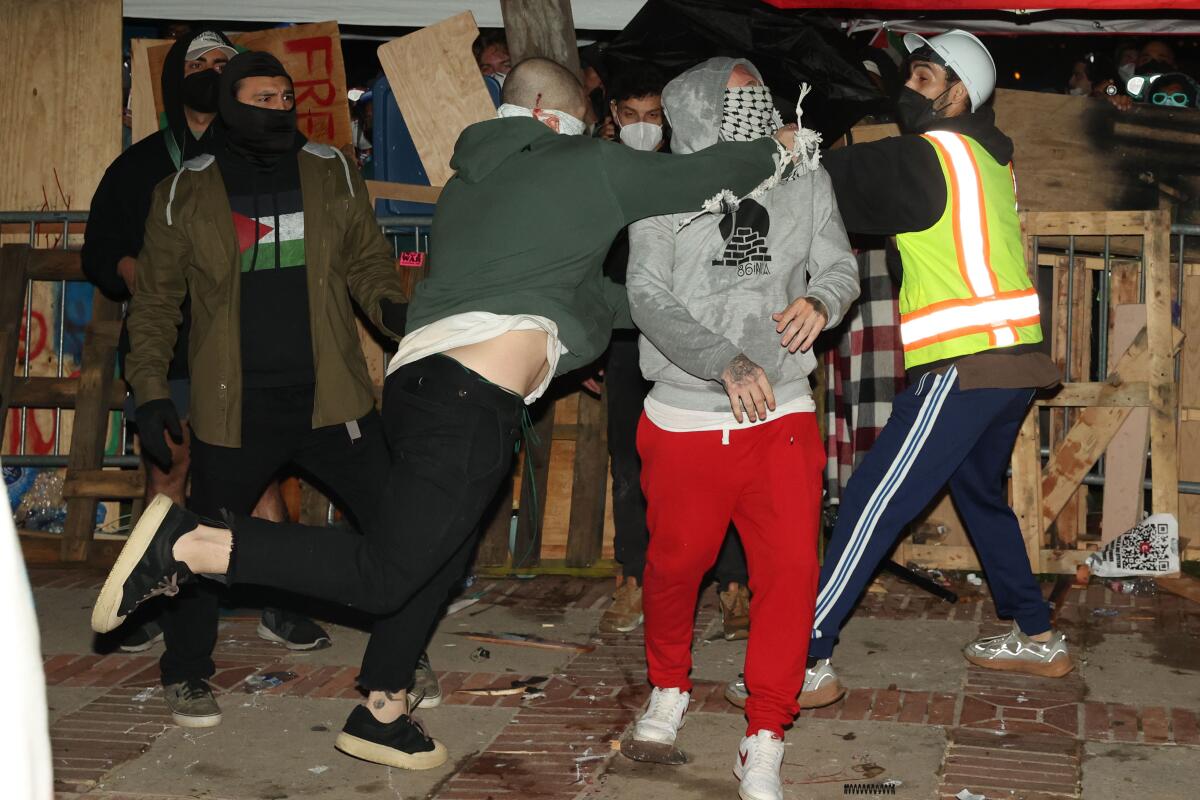
A pro-Palestinian protester, second from right, is assaulted by pro-Israel counterdemonstrators at a UCLA encampment.
(Michael Blackshire / Los Angeles Times)
After Tuesday’s late-night melee — and a slow campus response that a spokesperson for Gov. Gavin Newsom’s office called “unacceptable” — the encampment remained. And the pro-Palestinian protesters, who are demanding divestment from Israel and an end to the country’s military actions in Gaza, were defiant.
Kaia Shah, 23, a postgraduate researcher who has acted as a spokesperson for the encampment, said demonstrators got notice Tuesday from a university liaison that the encampment was unlawful and that students who continued to occupy the space could face suspension or expulsion.
Nonetheless, she said, “We plan on staying here until we get UCLA to divest.”
Shah described the scene Tuesday night as “violent and terrifying chaos,” and said her throat burned from inhaling all the mace in the air. She and another female demonstrator said some of the counterprotesters threatened to sexually assault women inside the encampment.
Shah said that, at one point, she saw police cars — it was unclear from which agency — pull up, turn around in a circle and leave. “The cops came and left as we were getting violently attacked by the Zionists,” she said.
Dueling chants rang out.

Pro-Palestinian protesters at UCLA huddle behind a makeshift barricade under attack by pro-Israel counterdemonstrators.
(Michael Blackshire / Los Angeles Times)
From inside the camp, they shouted: “Free, free Palestine!” and “Hold the line for Palestine!”
Outside, some counterdemonstrators screamed: “Second Nakba!” referring to the mass displacement and dispossession of Palestinians during the 1948 Arab-Israeli War. Others chanted: “USA! USA!”
As the violence unfolded, Citlali, a 25-year-old from Santa Ana who works for the organization Youth Organize! California and declined to provide her last name, said she frantically texted her younger brother, a student who was inside the encampment.
“Hey can you answer? Are you okay?? It’s okay to retreat,” she texted.
She said her brother was sprayed with bear mace and left the encampment Wednesday morning to wash up in his dorm room. “It’s gut-wrenching,” Citlali said. “I couldn’t sleep until 4 a.m. when he texted me that he was OK.”
After sunrise Wednesday, the UCLA chapter of Students for Justice in Palestine posted a list of their needs at the encampment: gas masks, skater helmets, shields, “super bright flashlights with strobe,” EpiPens, inhalers, hot lunches, gluten-free food.
Campus security teams, faculty members and California Highway Patrol officers guarded entrances to the encampment Wednesday morning.
Hannah Appel, an assistant professor of anthropology, stood at one entrance, where people dropped off medical supplies, face masks and water bottles. Only students with wrist bands indicating they were previously in the encampment and those who had someone on the inside vouching for them were allowed to enter, Appel said.
“Because of the escalated violence last night, we have to be very vigilant and careful about who can come in and out,” Appel said, before stepping aside to let a student squeeze through the barricades.
Vanessa Muros, an archaeology researcher at UCLA, showed up outside the encampment with finger cymbals, maracas and a tambourine. She said a call was sent out to students and faculty who participated in a band during a 2022 UC academic workers’ strike. The musicians were asked to help boost morale at the encampment.
“Apparently morale is low in there, and playing music or just making noise will help rally people together,” she said.
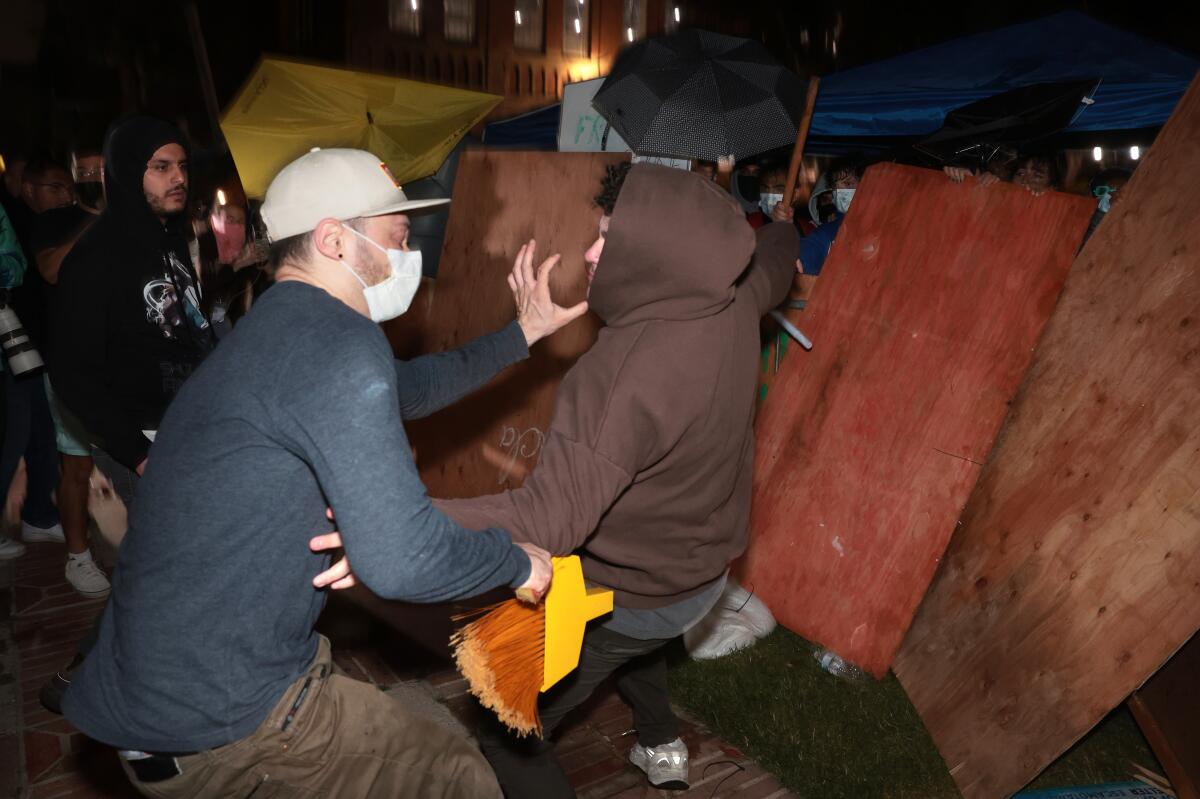
Pro-Palestinian protesters clash with pro-Israel counterdemonstrators at a UCLA encampment.
(Wally Skalij / Los Angeles Times)
Muros has worked at UCLA for 19 years and said she has never seen such mayhem on campus. “It’s upsetting, and I feel like the administration will blame the chaos on the students who have been peacefully protesting,” she said.
Renee Tajima-Peña, a senior faculty member, stood in a line outside Royce Hall to make a donation for the protesters: solar phone chargers, a poncho, some respirators.
“The story has been that all these students are irresponsible or causing problems,” she said. “I teach here and this encampment has been beautiful.”
Tajima-Peña was on campus Sunday when campers tussled with pro-Israel counterdemonstrators, who, she said, spit at students and shouted racial slurs.
“I was shoved by a guy a foot taller than me,” she said. “Another woman, a colleague of mine, also got shoved by some guy.
“But the students — they were so stoic. They didn’t want to engage and didn’t want to escalate. I was so proud.”
Times staff writer Safi Nazzal contributed to this report.
Politics
Video: Harris Blasts Trump Over Florida Abortion Ban

new video loaded: Harris Blasts Trump Over Florida Abortion Ban
transcript
transcript
Harris Blasts Trump Over Florida Abortion Ban
On the day that Florida began to enforce its six-week abortion ban, Vice President Kamala Harris delivered a searing attack on former President Donald J. Trump in Jacksonville, Fla., calling the measure “another Trump abortion ban.”
-
Today, this very day, at the stroke of midnight, another Trump abortion ban went into effect here in Florida. As of this morning, four million women in this state woke up with fewer reproductive freedoms than they had last night. This is the new reality under a Trump abortion ban. The contrast in this election could not be more clear. Basically under Donald Trump, it would be fair game for women to be monitored and punished by the government. Whereas Joe Biden and I have a different view. We believe the government should never come between a woman and her doctor. [crowd cheering]
Recent episodes in Abortion News
-

 Education1 week ago
Education1 week agoVideo: Dozens of Yale Students Arrested as Campus Protests Spread
-

 News1 week ago
News1 week agoLarry Webb’s deathbed confession solves 2000 cold case murder of Susan and Natasha Carter, 10, whose remains were found hours after he died
-

 World7 days ago
World7 days agoHaiti Prime Minister Ariel Henry resigns, transitional council takes power
-

 Politics1 week ago
Politics1 week agoFetterman hammers 'a–hole' anti-Israel protesters, slams own party for response to Iranian attack: 'Crazy'
-

 World1 week ago
World1 week agoPeriod poverty still a problem within the EU despite tax breaks
-

 World1 week ago
World1 week agoUS secretly sent long-range ATACMS weapons to Ukraine
-

 News7 days ago
News7 days agoFirst cargo ship passes through new channel since Baltimore bridge collapse
-

 World1 week ago
World1 week agoTurkey’s Erdogan meets Iraq PM for talks on water, security and trade
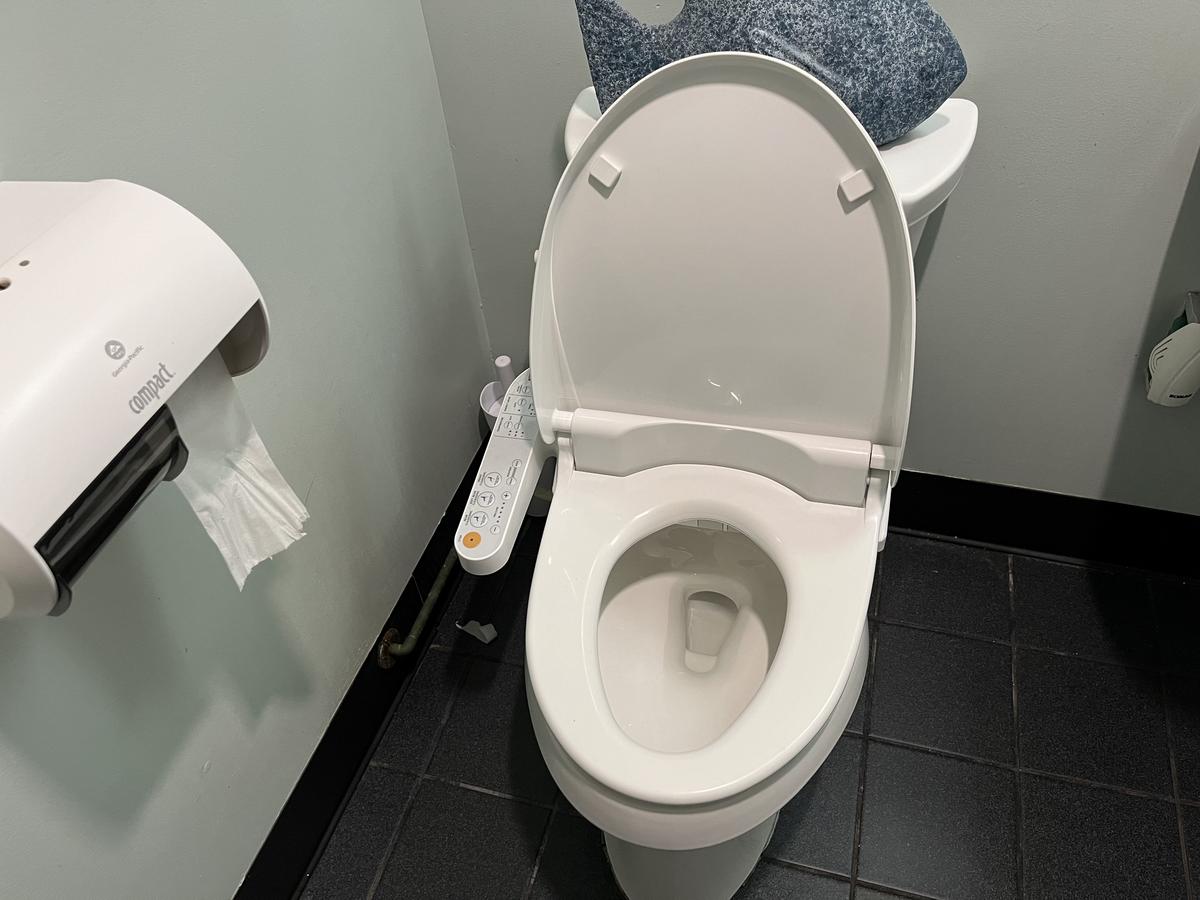
:format(url)/cloudfront-us-east-1.images.arcpublishing.com/baltimorebanner/MVTYU3EZMNCSJKR7KMZCMFHYXQ.png)
